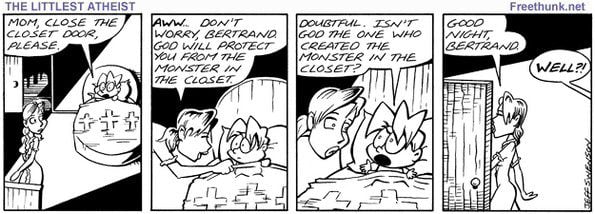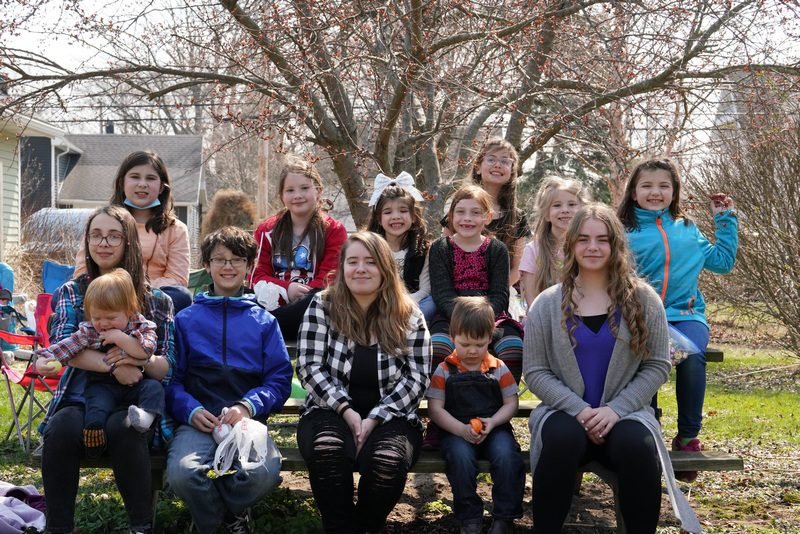
Over the years, I have had numerous Independent Fundamentalist Baptist (IFB) teenagers and young adults contact me. A handful of them wanted to evangelize me, but the rest of them wanted advice. Many of these letter writers were the children of IFB pastors, evangelists, missionaries, and church leaders. What these young people wanted was advice on what to do about their increasing doubts and unbelief. There they were, the children of devoted Fundamentalists, yet they had serious doubts about Christianity in general, and IFB beliefs in particular. Some of these letter writers told me they were atheists or agnostics. Most of them wanted to know whether they should “share” their beliefs with their parents, pastors, siblings, or friends. Raised in an environment that values zealotry, these doubting Thomases thought that, at the very least, people would appreciate their openness and willingness to speak honestly about their doubts and struggles. I told them that I thought it was a bad idea to tell anyone about their loss of faith. While I know that hard-core atheists will likely object to me silencing their coming out, I hope in the remainder of this post to explain why these closeted unbelieving young people should, for now, keep quiet.
I grew up in the IFB church movement. I am, by all accounts, an expert on its doctrines, practices, and culture. I attended an IFB college, worked as an assistant pastor in two IFB churches, and planted a new IFB church which I pastored for eleven years. My wife’s late father was a retired IFB pastor, and Polly’s late uncle, Jim Dennis, was an IFB pastor for more than fifty years. Polly has cousins who are IFB pastors, an evangelist, and a missionary. I’ve spent the last fifteen writing about Evangelicalism in general, and have focused a good bit of my attention on the IFB church movement. I spend several hours every day reading Evangelical and IFB blogs, websites, and news sites. From time to time, I even listen to sermons. While some might say that I am appealing to authority here, in the case of the IFB church movement, I know what I’m talking about. Having been both a congregant and a pastor, I have a well-rounded understanding of IFB churches. Many IFB preachers despise the work that I do because I dare to share the movement’s secrets. As a mobster-turned-snitch might say, I know where the bodies are buried.
IFB pastors, churches, and educational institutions do not value doubt, skepticism, or intellectual inquiry. The goal, instead, is obedience and conformity. What is fellowship? IFB pastors ask. It’s fellows in a boat rowing in the same direction. Dare to disagree with the pastor or oppose his teachings, and you will quickly find yourself thrown overboard. While a certain level of doubt is acceptable — as long as it is within the four sides of the IFB box — doubters are expected to resolve their questions by reading and studying the Bible. But what happens when you stop believing that the Bible is the word of God; when you stop believing that Jesus is a virgin-born, miracle-working, resurrected-from-the-dead Savior? What happens when you find IFB moral standards and personal behavior regulations a millstone around your neck? What happens when you want to experience the things teenagers and young adults in the “world” experience? What if you want to smoke a joint, drink a beer, have sex, or dress the way people outside of the church dress? What if you want to listen to secular music or enjoy the entertainments of the “world?” What if you just want to be yourself? What if you want be an out-of-the-closet gay or attend a public high school or college? What if you want to date the Catholic boy next door or skip church so you can play sports or attend a rock concert? While all of these behaviors and questions might seem silly to people outside of the IFB church movement, people raised in Fundamentalism know what can happen if you refuse to play by the rules and toe the line. Some readers of this blog were shipped off to IFB group homes when they were teenagers in the hope that their rebellion — a favorite IFB word — would be cured. Once imprisoned in these indoctrination camps, they were psychologically and physically abused. Some of them were sexually assaulted and raped. What was their crime? Rebellion, which the Bible says is as the sin of witchcraft. Once “cured” they were expected to return home and do what they were told.
During my time in the IFB church movement, I saw teenagers assaulted and beaten for refusing to obey. In one church, I had a family come to me and tell me that they were considering cutting off all the hair from the head of their rebellious teenage daughter. Appealing to the Bible, this couple believed that cutting off her hair would teach her a lesson. Fortunately, I was able to persuade them not to do this. And I am hardly without fault. As I look back over how we disciplined our children — or better put how “I” disciplined our children — the only conclusion I can come to is that I, at times, physically abused my three older boys. Fortunately, I saw the error of my ways when it came to my three younger children, and I abandoned corporal punishment as a way to extract compliance and obedience. While I can say that I was only modeling what I experienced in my own life and saw in the lives of men I admired, the fact remains that I used violence as a means of discipline. I know that corporal punishment is still common in IFB homes. I also know that it is not beyond many IFB parents to use draconian methods to drive the devil from the hearts of their children. I’ve spent countless hours reading the stories of adults who were savaged by their IFB parents as children and teenagers. These parents believed they were just following the Bible when they harshly attempted to drive rebellion out of the hearts of their children. And they were. The Bible is clear on the matter. Parents who love their children should righteously and frequently use the rod of correction, driving rebellion and disobedience from their hearts.
It is knowing all of these things that causes me to advise doubting IFB teenagers and young adults to keep their unbelief to themselves. Bide your time. Play the game. Fake it until you make it — “make it” being out of the house and on your own. It’s not hard to fake belief. Anyone can do it. I suspect that most IFB churches have congregants who are just playing the game; that they are attending church, with Bible in hand, praying when asked, and doing all the things good Christians are supposed to do, without believing a word of it. Some IFB pastors think that they can spot frauds from a mile away, but I know better. Truth be told, some of those frauds are their own children and spouses. Yes, I’ve even heard from pastor’s wives who are secret unbelievers.
I can only imagine how difficult it must be to be an unbeliever in a sea of Fundamentalist faith. But, due to the serious and real risks involved in publicly announcing unbelief (or that one is gay), I strongly advise that doubting IFB teenagers and young adults keep their lack of faith to themselves. Go to church on Sunday morning, Sunday night, and Wednesday night, and play the game. You can do it. In the meantime, seek out people who can privately encourage and support you. Those who have written me over the years know that my email inbox is always open. I encourage them to not only read my writing, but also to read the stories of other people who have left Christianity. But even here, they must be careful. IFB parents can be quite controlling. I remember my youngest daughter being a pen pal with another pastor’s daughter. I never read my daughter’s letters, but her pen pal’s mother read every one of my daughter’s letters before giving them to her daughter. She also read every letter her daughter wrote to mine before it was sent. After word got out that Pastor Gerencser and his family were no longer attending church, the letter-writing stopped. I wish I could say that the IFB teens and young adults who write me should go to their parents for support and understanding. The problem is that I doubt whether their parents would be okay with their unbelief. How could they? Allowing an unbelieving child in your home, especially if you are a pastor, is a sign that you do not have your children under control. Remember, IFB churches thrive on conformity, obedience, and control. Imagine what would happen if IFB parents let their children think for themselves. Why, in their minds, rebellion, heresy, and sin would abound.
I know the advice I’m giving here is hard to take, but I do have the best interests of these teenagers and young adults at heart. I wouldn’t want to tell them to be out and proud, knowing that doing so could cause them great harm. I know that when you are fifteen, time moves oh, so slowly, but if these doubters will just play the game, before they know it they will be graduating from high school and will then be free to tell the world they are not believers. And shouting it from the mountaintops will certainly cause continued stress and conflict, but it’s on IFB parents and churches to deal with the fact that they had unbelievers in their midst; that an increasing number of teenagers and young adults are no longer buying what preachers are selling; that what these unbelieving young adults want most of all is acceptance for who they are, and the freedom to think for themselves and to follow the path wherever it leads.
Bruce Gerencser, 68, lives in rural Northwest Ohio with his wife of 47 years. He and his wife have six grown children and sixteen grandchildren. Bruce pastored Evangelical churches for twenty-five years in Ohio, Texas, and Michigan. Bruce left the ministry in 2005, and in 2008 he left Christianity. Bruce is now a humanist and an atheist.
Your comments are welcome and appreciated. All first-time comments are moderated. Please read the commenting rules before commenting.
You can email Bruce via the Contact Form.

